Celebrating Over 4 Million Lives Transformed: International Day of Education 2025
On this International Day of Education, the Billion Child Foundation (BCF) is thrilled to celebrate a monumental milestone: since 2008, our programmes have benefited over 4 million children.
Education is the foundation of a brighter future, which is why BCF champions the belief that “Nothing stops bullets, famine, and ignorance like education.”
Through our International Schools Centre of Excellence Programme, we have partnered with Ministries of Education to transform underperforming schools into hubs of opportunity and empowerment. An incredible 89% of participating schools now consistently deliver quality education in every classroom.
We are also proud of the International Parenting Skills Programme, which has equipped over 257,000 parents to raise confident, self-reliant children. By empowering parents we help shape brighter futures for families and communities alike.
BCF’s programmes are scalable and replicable enabling every country to implement our proven systems. Our mission remains clear: ensure no child or school is left behind and to transform every school and classroom.
As we celebrate the impact of our work, we remain committed to expanding our reach and driving meaningful change. Together, we can create a world where every child has access to quality education and the opportunity to fulfil their potential.
Join us in marking this International Day of Education by championing the transformative power of education. Let’s work together to ensure every child, everywhere, has a chance to thrive.

Our Scalable Solution to the Global Education Crisis
The Global Crisis
Throughout the world millions of children are unable to receive quality education at their local public school. Despite millions of dollars being invested in programmes intended to transform these underperforming schools over the past 50 years, little has changed. These schools seem inured to any intervention,
A Scalable Breakthrough Solution
The Billion Child Foundation’s (BCF) International Schools Centre of Excellence Programme offers a proven, cost-effective solution to this crisis. This programme empowers ministries of education to simultaneously transform thousands of schools by equipping leadership teams with the strategies, accountability mechanisms and skills needed to set each school on a journey to become a centre of excellence. Since its inception in 2011, the programme has consistently delivered remarkable results transforming entire education districts simultaneously.
The Proof
In 2022, the Limpopo Provincial Department of Education in South Africa commissioned BCF to train leadership teams at 1,518 underperforming schools simultaneously.
The outcomes speak for themselves:
• 2023: Students graduating from high school with a university or TVET college admission matriculation pass rose from 57% to 68%.
• 2024: This figure climbed further to 75%.
• 2025+ Further increases are expected over the next few years.
These extraordinary results were achieved despite significant challenges, including widespread poverty, daily power outages impacting on schools and homes, parents being unable to afford to purchase tablets or data, and students almost missing a year of education due to Covid.
Why the world needs this Programme
BCF’s programme is:
• Scalable: Capable of transforming thousands of schools simultaneously.
• Replicable: Adaptable to any country’s context.
• Sustainable: Leads to continuous improvement year after year.
• Cost-effective: Delivers extraordinary results requiring an investment of less than USD 10 per school.
A Call to Action
We firmly believe that the BCF International Schools Centre of Excellence Programme is the silver bullet the world’s education systems urgently need. By implementing this programme, millions of children will gain access to quality education at their local schools providing the world with educated citizens able to proudly support their families and contribute to their local economies.
If you represent an organisation committed to transforming global education – or know someone in a senior position within such an organisation – please forward of this News Flash to them. Together, we can launch this transformative programme worldwide.

Workshops and online training for school leadership and teachers
- Presentation skills for school leaders and teachers.
- How to focus your school management team and teachers on creating a culture of excellence.
- How to create a winning culture at your school based on the strategies, tactics and leadership style of the coach of the springbok rugby team which won the Rugby World Cup in 2019 and 2023.
- How to recruit top teaching talent – right first time.
- How to ensure effective communications between school leadership, academic staff, parents and the community.
- How to market your school effectively to attract top teaching talent and enthusiastic parents.
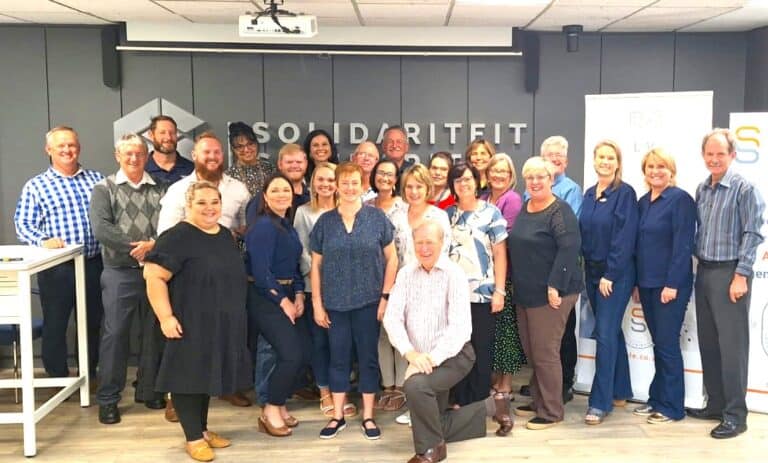
Great news! In 2022, 1,518 school leadership teams complete training to begin their journey to simultaneously transform their schools into centres of excellence.
These 1,518 schools which are attended by over 570,000 students are situated in the rural Capricorn North, Vhembe East and Vhembe West education districts in South Africa which are situated adjacent to the Zimbabwe border and the border of the Kruger National Park.
The International Schools Centre of Excellence Programme has empowered the entire education supply chain (head of provincial departments of education, three district directors, circuit managers, principals, middle managers, teachers, students, parents and each school community) to become fully engaged in transforming the culture at underperforming schools into cultures experienced at high performance schools.
The Programme was driven by the Head of the Limpopo Department of Education and the three District Directors but was implemented from bottom up by each school management team, teachers, students, parents and the community. A winning combination!!
The simultaneous training of 1,518 schools to begin their respective journeys become centres of excellence provides evidence of the sustainability, replicability and scalability of this Programme.
De Beers and Worley Ltd who commissioned BCF to conduct this Programme to leave a meaningful legacy in the footprint of the mine are delighted with the progress made.
The results have been extraordinary:
- 2023: Bachelor and Diploma matriculation passes rose from 56% in 2021 to 68%.
- 2024: This figure climbed further to 75%.
- 2025+: Continued annual improvements are expected.
- Despite facing challenges such as poverty, load shedding, limited access to computers and tablets, parents not being able to afford to purchase data and numerous weeks lost due to Covid, the Class of 24 excelled.
Key Outcomes
The table below highlights the exceptional improvements in the three Limpopo districts trained:
These results provided by the South African Department of Basic Education, which exclude progressed students because of their age, illustrate the effectiveness of the International Schools Centre of Excellence Programme.
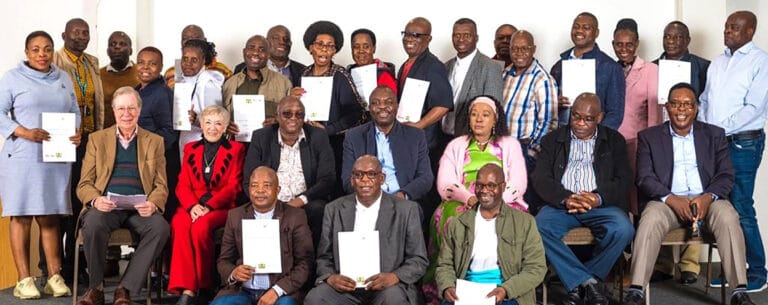
Training of school leadership teams in Lesotho to set their schools on a journey to become centres of excellence
UNICEF funded the training of school inspectors in Lesotho to train school leadership teams to begin their journey to transform their schools into centres of excellence.
In the final report to UNICEF the Lesotho Ministry of Education and Training reported that 61% more learners graduated from previously under-performing primary schools compared to the control group.
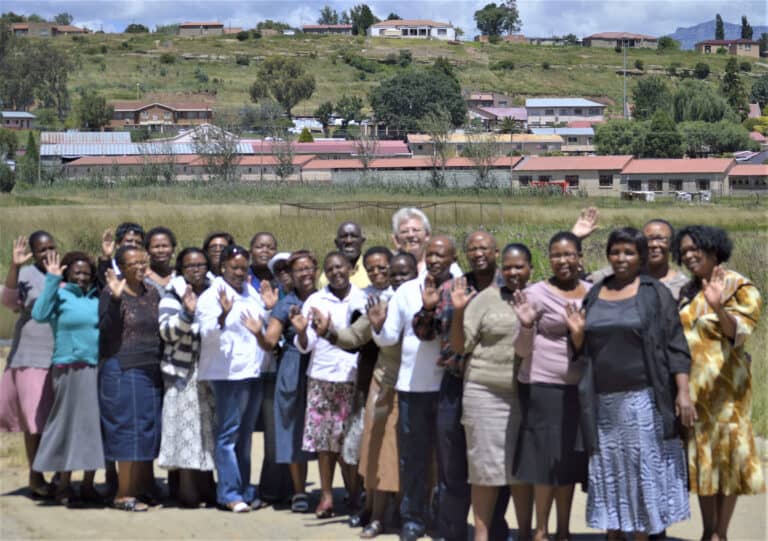
Transforming education at under-performing schools in South Africa
BCF has trained thousands of school leadership teams to begin their journey to transform their schools into centres of excellence since 2011.
The percentage of students gaining a basic school leaver matriculation pass at schools whose school leadership teams had participated in this Programme increased every year from the year in which they were trained for approximately six years before plateauing at 90%.
During the covid years, 2020 – 2022, despite missing over 100 days of formal education and many families not being able to afford data to take advantage of online teaching, the percentage of students passing remained constant between 85% and 86%. This demonstrates the resilience and sustainability of the Programme. The school leadership teams, teachers, students and parents who are proud of the achievements of their schools are determined that school results will improve every year. A sense of ownership is a key to success of this Programme.
The percentage of students gaining either a university or technical university matriculation pass at schools whose school leadership teams participated in the Programme prior to 2016 increased from 52% in 2015 to 76% in 2024. This provides evidence that a tradition of high performance effective teaching and effective learning is achieved at these schools.
Many of the principals who attended training between 2011 and 2016 have retired, died, or were promoted. Despite change of leadership at schools, the high performance culture and academic results remained intact confirming the sustainability of the Programme.
Once a high performance tradition and culture is in place, the entire school community works as a cohesive team to ensure standards are maintained.
In 2018 DBE reported that the percentage of students passing English in Grades 5-7 at primary schools whose school leadership teams had been trained increased from 54% in 2014 to 87% in 2017 while the percentage of students passing mathematics in Grades 5-7 increased from 39% in 2014 to 65% in 2017.
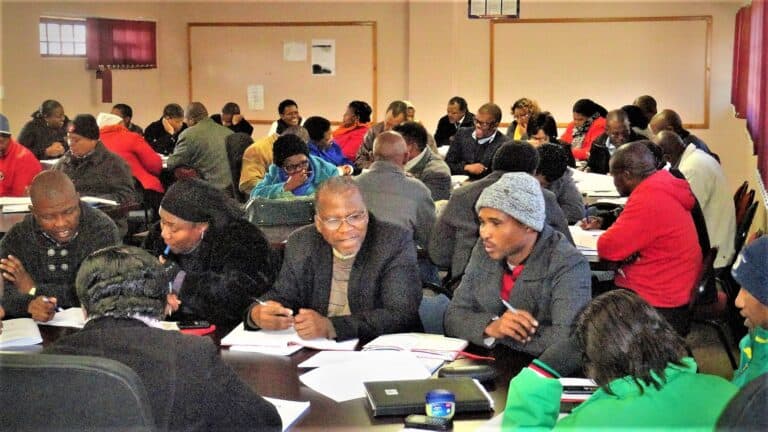
157,000 parents have attended the South African National Parenting Skills Programme since 2008
At these workshops parents learned the practical skills they need to raise their children to become confident, self-reliant individuals.
Parents also learned how to encourage their children to read and do homework every day, the importance of their children not dropping out of school and remaining at school until they matriculate.
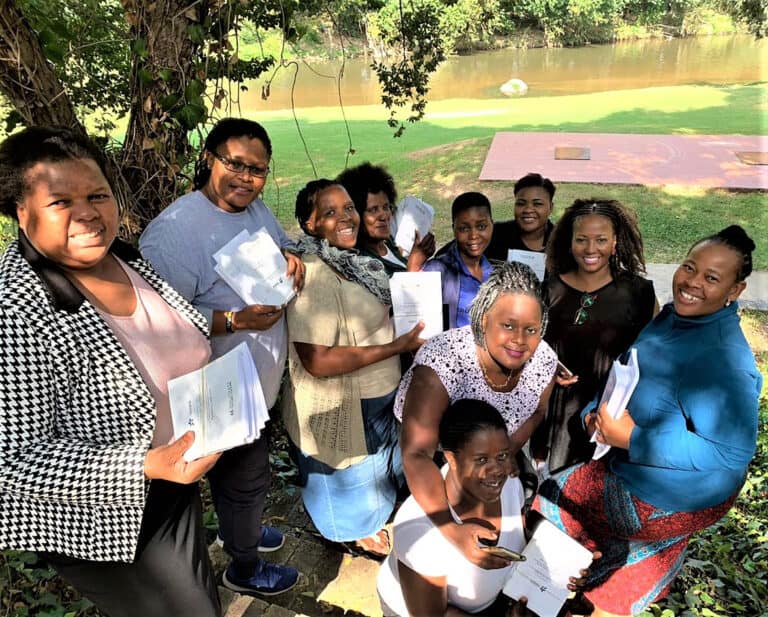
Discussions with Ministries of Education in Sub-Saharan Africa
The methodology of this Programme has been studied by the Ugandan, Tanzanian and Zambian Ministries of Education and been found compatible with their objectives, structures and their teaching methodologies.
BCF received Letters of Intent from the Ministries of Education in Uganda and Zambia indicating they wish to launch the Programme but with the caveat that external funding would be required.
BCF has received informal enquiries regarding a fully funded programme from seven African countries,
With minor adaption, this Programme is replicable in every country.
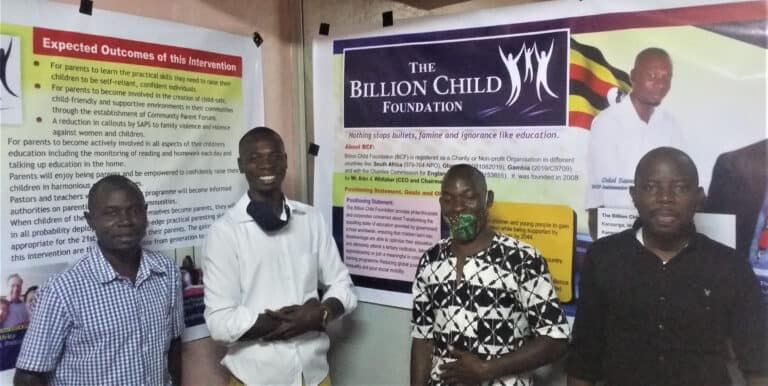
Training of pastors in the dangerous Langa township in Cape Town
SAGA (UK) funded the training of pastors to train congregants and members of the community in practical parenting skills. Pastors trained over 2,000 parents.
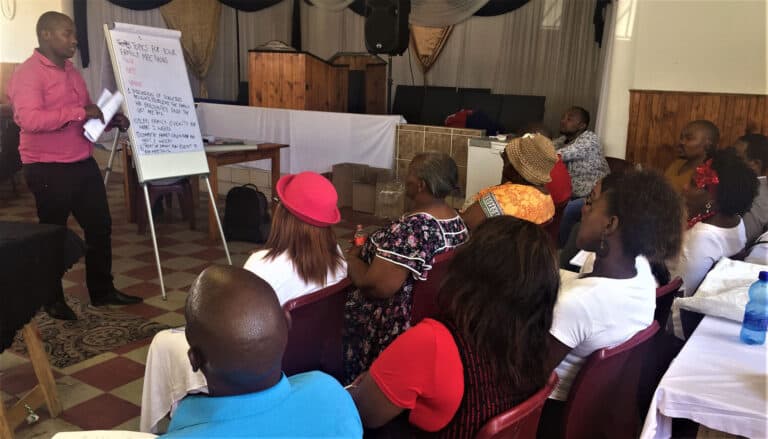
International Award: EduWeek 2018 NGO of the Year
BCF was awarded the above award at the 2018 EduWeek Conference in Johannesburg which was the biggest edutech conference in Africa that year attracting over 4,000 delegates
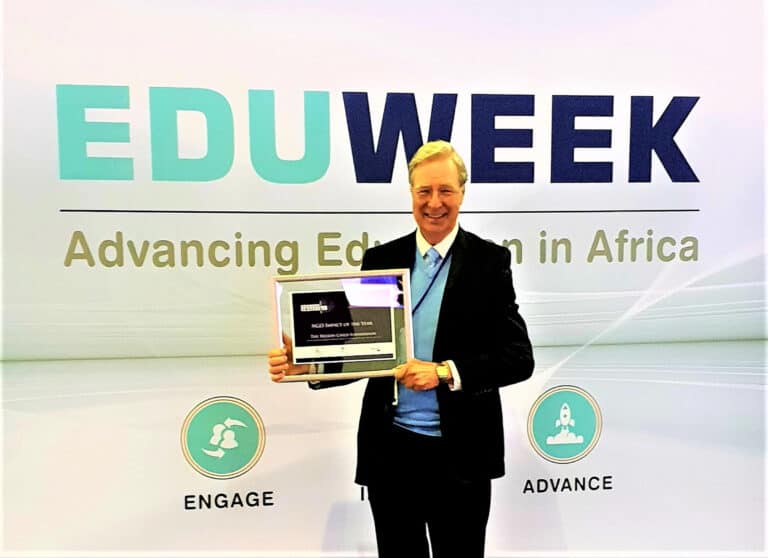
How Fezile Dabi rose from being a failing education district to become the best performing education district in South Africa
In January 2011, few students entering the matriculation class at underperforming schools in the Fezile Dabi education district in the Free State Province expected to pass because only 48% of the students who wrote in 2010 had gained a basic school leavers matriculation pass. (No changes)
Although they did not know it, their futures were about to change. (No changes)
At the end of the 2011 academic year 75% of the students passed!! In 2012 79% and 2013 86%.
Every year since 2019 Fezile Dabi has obtained the highest matriculation results in South Africa despite most of the schools being situated in rural areas or in the townships on the outskirts of towns and villages. In so doing it has beaten the education districts in Johannesburg and Cape Town where there are many well-resourced schools which were established over 100 years ago which attract top teaching talent and are handsomely supported by alumni and local businesses. The reason Fezile Dabi beats these districts is because it does not have under-performing schools. (Changed copy Steve)
Amazingly, in 2024, 97% of students who wrote obtained a matriculation pass while 86% gained a university of TVET college matriculation pass!!
What happened
School management teams from underperforming schools in this education district attended the Billion Child Foundation International Schools Centre of Excellence Programme
School management teams learnt how to mobilise and inspire teachers, learners, parents and school communities to proudly work as a cohesive team to develop a culture of effective teaching and effective learning with teachers and parents proudly playing a key role in the education of each child.
Pride, ownership and accountability are the keys.
When teachers feel they are part of something bigger than themselves they prepare lessons more thoroughly and present them in the classroom more effectively.
How a traffic policeman was reduced to tears
A few years ago our Chairman and CEO, Alan, was driving back from Bloemfontein to Pretoria in South Africa which is a round trip of 10 hours. On the return journey 300 km north of Bloemfontein a large traffic policeman stopped him for travelling at 140 km per hour.
He admitted he had exceeded the speed limit of 120 km per hour and climbed out.
They both leaned against the car and discussed the weather and sport while the officer worked around to the fact that a policeman’s shoes don’t last very long. Before the officer could ask for money for the shoes Alan said he wanted to show him why he had been to Bloemfontein.
In the boot was a contract signed that morning by Stanley Malope the Superintendent General of Free State Provincial Department of Education commissioning BCF to train an additional 108 school management teams to transform their schools to become centres of excellence.
After examining the contract, the police officer asked him if his name was Ellen. He told a wonderful story about his son.
During July, the previous year his son who was in Grade 12 wanted to drop out of school as he felt he was certain to fail to gain a university entrance matriculation during the year end examinations.
He said that someone called Ellen had been responsible for training the school management team of the school his son attended.
Suddenly everything had changed. The teachers began teaching. They started after school ‘clinics’ for those who needed extra lessons. The parents and community came on board.
Cutting short the story he told Alan with tears running down his face, his son was now at university and had just completed his first year to become a land surveyor.
He told Alan to get back in his car and drive 23 km to the next Services and to get the jockey to take the petrol out of my car and replace it with Red Bull as my car would go faster so that he could get home sooner!!!
Not bad for the police officer who had stopped Alan for speeding!
Alan wanted to share the story with you to demonstrate what it means to children and parents when you transform a school into a centre of excellence. The students get a very real chance to escape a life in poverty to enjoy a middle-class lifestyle.
To date BCF has trained thousands of school management teams to transform their schools into centres of excellence. Over 4 million students at these schools have been the beneficiaries of the generosity of UNICEF, VVOB, Worley Ltd and many other Foundations and Trusts.
